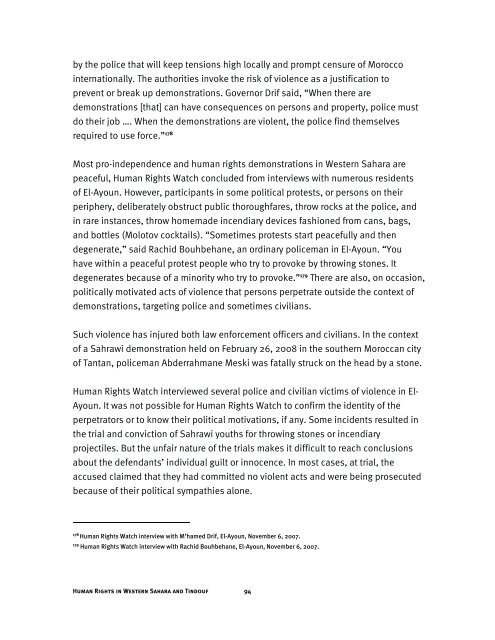Download full report with cover - Human Rights Watch
Download full report with cover - Human Rights Watch
Download full report with cover - Human Rights Watch
You also want an ePaper? Increase the reach of your titles
YUMPU automatically turns print PDFs into web optimized ePapers that Google loves.
y the police that will keep tensions high locally and prompt censure of Morocco<br />
internationally. The authorities invoke the risk of violence as a justification to<br />
prevent or break up demonstrations. Governor Drif said, “When there are<br />
demonstrations [that] can have consequences on persons and property, police must<br />
do their job …. When the demonstrations are violent, the police find themselves<br />
required to use force.” 178<br />
Most pro-independence and human rights demonstrations in Western Sahara are<br />
peaceful, <strong>Human</strong> <strong>Rights</strong> <strong>Watch</strong> concluded from interviews <strong>with</strong> numerous residents<br />
of El-Ayoun. However, participants in some political protests, or persons on their<br />
periphery, deliberately obstruct public thoroughfares, throw rocks at the police, and<br />
in rare instances, throw homemade incendiary devices fashioned from cans, bags,<br />
and bottles (Molotov cocktails). “Sometimes protests start peace<strong>full</strong>y and then<br />
degenerate,” said Rachid Bouhbehane, an ordinary policeman in El-Ayoun. “You<br />
have <strong>with</strong>in a peaceful protest people who try to provoke by throwing stones. It<br />
degenerates because of a minority who try to provoke.” 179 There are also, on occasion,<br />
politically motivated acts of violence that persons perpetrate outside the context of<br />
demonstrations, targeting police and sometimes civilians.<br />
Such violence has injured both law enforcement officers and civilians. In the context<br />
of a Sahrawi demonstration held on February 26, 2008 in the southern Moroccan city<br />
of Tantan, policeman Abderrahmane Meski was fatally struck on the head by a stone.<br />
<strong>Human</strong> <strong>Rights</strong> <strong>Watch</strong> interviewed several police and civilian victims of violence in El-<br />
Ayoun. It was not possible for <strong>Human</strong> <strong>Rights</strong> <strong>Watch</strong> to confirm the identity of the<br />
perpetrators or to know their political motivations, if any. Some incidents resulted in<br />
the trial and conviction of Sahrawi youths for throwing stones or incendiary<br />
projectiles. But the unfair nature of the trials makes it difficult to reach conclusions<br />
about the defendants’ individual guilt or innocence. In most cases, at trial, the<br />
accused claimed that they had committed no violent acts and were being prosecuted<br />
because of their political sympathies alone.<br />
178 <strong>Human</strong> <strong>Rights</strong> <strong>Watch</strong> interview <strong>with</strong> M’hamed Drif, El-Ayoun, November 6, 2007.<br />
179 <strong>Human</strong> <strong>Rights</strong> <strong>Watch</strong> interview <strong>with</strong> Rachid Bouhbehane, El-Ayoun, November 6, 2007.<br />
<strong>Human</strong> <strong>Rights</strong> in Western Sahara and Tindouf 94


